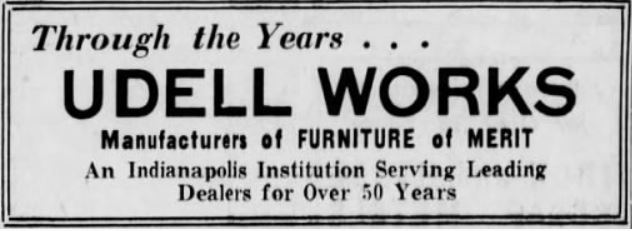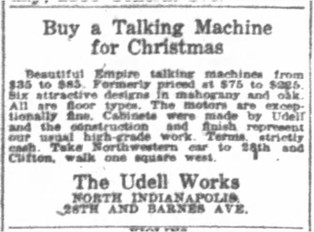Built Local: Exploring the Site, and History, of the Udell Furniture Works
- Ed Fujawa
- Jun 6, 2020
- 7 min read
Updated: Aug 22, 2020
Indianapolis is in the process of extending the Tow Path Greenway south of its present terminus at 30th Street. While the original tow path continued onward to downtown, the section south of 30th was turned over to industrial uses and railroad right of ways. With many of those railroads now out of operation, the extension of the trail has been discussed for many years, and the new trail continues on the western bank of the canal (the traditional location of the Tow Path) and continues down to the Burdsall Parkway. The trail isn’t quite done yet, but plenty of people have been running and cycling on the trail, including myself. A few Saturday’s ago I was taking a bike ride around the city, and was exploring the new trail. Just south of 29th Street, on the eastern side of the canal. I spotted a large three-story brick which was clearly quite old, and appeared empty.

I started investigating the property and structure once I returned home and found that this building was once part of the Udell Works, a longstanding manufacturing operation which focused on a variety of wooden items, with an emphasis on furniture pieces. The company first started at West 28th Street and the Canal in 1873, as the Udell Ladder and Wooden Ware Co., when Calvin Udell of Chicago moved his manufacturing interests to Indianapolis. At the same time, he maintained salesrooms for his products in other major cities around the country. Udell was also an inventor, and over the course of his life would have several patents to his name. One of these was the Udell ladder, and at the time he commenced operations in Indianapolis, the company focused on the production of ladders, wooden plates, and utensils.

Located in what was called North Indianapolis (usually called United Northwest today), which was considered a suburb of Indianapolis at the time, Udell was a major employer for the area and something of an institution, and many of the employees and their families lived in the adjacent neighborhoods. Jacob Dunn, in his work, Greater Indianapolis, noted that North Indianapolis “pinned its faith” to various industries, including the Udell Works, which were located within its boundaries. The engraving below depicts the Udell works complex circa 1893, although the scale of the image is inaccurate. While the structures pictured actually existed onsite, their sizes have been exaggerated. The surviving structure I photographed is the section of the factory just to the right of the tower (actually a water tower) with the Udell flag.

Udell was a large employer, with its workforce numbering 75 in 1874, and into the hundreds in the early 20th century. In 1915 Udell had 200 employees, and in the middle of the Great Depression 130 employees were working at Udell. With many Udell employees living in the nearby community, and with the suburb growing, the Udell Works even hosted church services in 1873. The Indianapolis Journal reported on November 22, 1873 that “a room has been prepared in the north end of the Udell works for the purposes of holding Sunday services and Sabbath school.” Ministers from four Christian denominations were to be present in order to serve the various beliefs in the neighborhood.

Production continued on various woodworked items, including the ladders and household items. On August 13, 1879, Udell reported that 101,100 wooden dishes were made in just one day. That same year Udell advertised hiring for the manufacture of butter dishes. However, the Udell Works ran into troubles in 1880 when a receiver was appointed due to a "disagreement between owners" as reported by the Indianapolis News. Additionally, an annual report published in 1878 noted the company's resources as $100,232, with liabilities in the same amount. The works were headed for sale, although local reports suggested outside buyers were in place to purchase the works and take the operations out of state, unless local interests could step in with enough funding. On March 1, 1882, the Marion County Superior Court offered Udell for sale. Local interests did step up and Udell was purchased by Indianapolis businessman Albert A. Barnes, who expanded the facilities on the Udell complex to cover several blocks south of the intersection of Udell Street and the now named Barnes Street (named after the new owner of Udell), and added to the products produced, including various types of household furniture.
The surviving building in the photo I took at the top of this post does not appear in the Sanborn map covering the Udell Works property in 1887, although the complex of production facilities and warehouses was already quite extensive. However, in December 1891, the Indianapolis News reported that a new factory building had been completed. The Sanborn maps for 1887 and 1898 (slide show below, 1887 first) show several new constructions on the Udell site, between those years. The portion of the building outlined in red on the 1898 map is the existing structure in the image at the top of the post.
The turn of the century continued to be busy for the Udell works, and it was still seen as the “industrial backbone of North Indianapolis.” The 1920’s and 1930’s saw Udell continue to operate, constructing furniture and a variety of other wooden items, including wooden cabinets for radios. This time period also saw a increase in the amount of advertising by Udell in local newspapers. Below are examples of ads from the Indianapolis News and Star. Going clockwise, the years are 1938, 1940, 1935, 1921.
Albert A. Barnes died in 1928, spurring another change in leadership of Udell, when longtime employees Howard T. Griffiths and H. H. Philips purchased the company for $105,000, beating out other interested parties by offering a cash bid. An interesting twist with the sale was that the proceeds were to be given to Franklin College in Johnson County per Barnes' will. $60,000 was allocated for the construction of a new science building on campus (there is a Barnes Hall on the campus now), while the remainder would go towards the college's endowment. The sale had been finalized because the administration at Franklin determined that despite receiving the controlling stock through Barnes's will, they did not have the authority to operate the business.
Udell operated under the direction of Griffiths through the Great Depression, even introducing new lines of furniture, and reporting increased production in 1931, despite the depressed state of the economy. On April 4, 1931, Howard Griffith, while speaking to the Star about Udell's financial position, noted that he believed the worst of the depression was over and two years later, in 1933, Udell celebrated its 60th anniversary. In September 26, 1936, Griffith provided comment at board meetings considering an increase in funding for the city's schools. Griffith was opposed to tax increases and supported maintaining taxes at the present levels, noting that Udell was "one of three furniture plants in Indianapolis. Our firm keeps 130 families eating and taxes constitute one of our most difficult problems."
Eventually, Giffith's leadership of Udell ended in 1952, when he sold the company to Indianapolis businessman Julian Freeman, who himself operated local manufacturing companies, Freeman Store Equipment Co., and Nor-Ben, Inc.. Freeman consolidated these other operations to the Udell complex on Barnes Street, although it appears his existing operations had priority, as advertising for Udell all but disappeared from local media. Additionally, not long after the sale to Freeman an auction was held for a large amount of wood working and other machinery due to the "consolidation of two manufacturing facilities." Griffith retired from Udell, and was permitted to maintain an office in the Udell complex for sometime after the sale. Other officers and minority owners of Udell retired and separated themselves from the business. At the time of the sale, the Star reported that Udell's primary product were kneehole desks for homes, and wooden cabinets for televisions.
Freemen's association with the Udell site was relatively short. In 1958, he was accused of submitting false tax information in 1952 in an attempt to avoid $70,000 worth of corporate taxes related to the now defunct Nor-Ben, Inc., which had gone into bankruptcy in 1955. Freeman eventually pleaded guilty to tax evasion and received a $10,000 fine, 2 year suspended sentence, and probation. Additionally, civil tax liabilities and penalties related to his business interests (not personal liability) totaled $425,000. In May 1963 Freeman Store Equipment Co. filed for bankruptcy, and in January 1964 advertisements in local newspapers appeared announcing the auction of wood working equipment. fixtures, and other materials at the Freeman Store Equipment Co., "by order of the mortgagee." By this time, it appears the Udell operations had ceased completely.

In November 1973, a short notice in the Indianapolis Star reported on the impending dissolution of the corporate entity of the Udell Works, even though the Udell name had not made much of an appearance for the previous few decades. On June 23, 1982, a fire broke out at the former Udell factory during demolition of one of the original structures. Another fire in one of the surviving factory buildings in 1995 required evacuations in the adjacent neighborhood due concern about old phosphates being stored in the structures igniting.
Today, the property is primarily used by Kopec Electric, with other businesses using the southern end of the former complex. Aside from the three story factory building, a one story structure just to its north, and abutting Udell Street, may be the 'dry kiln' building noted in 1898 Sanborn map. I attempted to gain access to the property to view the factory building up close, and had permission from the owner to do so, but a few days later this permission was revoked. However, images from public right of ways, such as the photo at the beginning of the blog and the photos below, still show some detail. Also, please note that the images below were taken from the Central Canal right of way on the east bank of the canal, not from private property. These photos are facing the east.
Udell furniture can still be found today at antique shops and auctions. As of May 31, 2020, a search online identified two Udell pieces up for auction, one on Bay. Other collector websites and auctions sites also display Udell furniture


Sources
Indianapolis News, November 12, 1874, January 21, 1878, May 13, 1928, April 8, 1952
Indianapolis Star, May 20, 1928, November 23, 1973, April 4, 1931, June 23, 1982, September 26, 1936, March 28, 1958, December 13, 1958, October 30, 1959
Indianapolis Illustrated, Consolidated Publishing Co, (1893), http://www.digitalindy.org/cdm/ref/collection/IH/id/5767
IUPUI Sanborn and Baist Collection, http://www.ulib.iupui.edu/collections/sanbornjp2
Official Catalogue of the Inter-State Industrial Exposition of Chicago, Ill, 1873, https://archive.org/details/officialcatalogu00chic/page/n75/mode/2up?q=Udell+ladder
Dunn, Jacob Piatt, Greater Indianapolis : the history, the industries, the institutions, and the people of a city of homes (1910)















